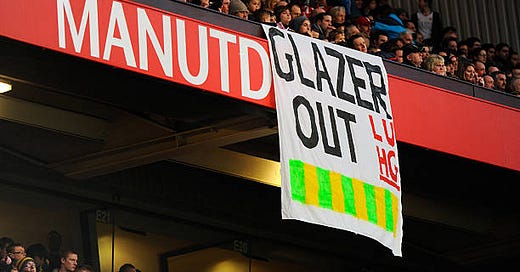When the plans were announced, in 2021, for the formation of a Super League involving Europe’s elite clubs, I was asked to write a piece for a US. magazine. This is the piece, now with added footnotes. The plans have never really gone away, but they are being snuck in through a back door.
In March, 1986, straight after a match against Coventry City, the Arsenal manager Don Howe resigned. He was unhappy, unsurprisingly, that the club seemed to have approached the Barcelona coach Terry Venables behind his back. As the rumours of his departure spread around the departing fans, an impromptu protest broke out, and a chant of “You’re just a stuck up c***t, Hill-Wood, Hill-Wood” was aimed at the chairman, Peter, the son of former chairman Denis, and the grandson of former chairman Samuel - Arsenal Football Club had been run by the same family since 1929. Nowadays, everyone has a double-barrelled surname, to reflect that a child is very often the product of two parents, but back then it meant something: it meant that the Hill-Woods were posh. They had all been to Eton, the elite boarding school that has wreaked so much havoc on British life - Boris Johnson and David Cameron went there Several other people on the Arsenal board were old Etonians – ‘Chips’ Keswick, for example, and Sir Roger Gibbs, a classmate of Peter’s.
The crowd’s ire was quite precisely targeted. The board had messed up; the board deserved abuse. They had behaved sneakily, without the class that was, at the time, the club’s USP. Yet in 1985, Arsenal hadn’t won a Championship for fourteen years. Liam Brady, probably the greatest home-grown talent the club has ever produced, had left a few years before, for Italy, where he won Championship medals with Juventus. He had refused to sign a new contract in part because he felt the club was drifting, refusing to invest in the talent that would turn Arsenal into title contenders. And yet somehow the fans were phlegmatic about this. We supported a team that had won just one FA Cup since 1971, and that was just the way things were. The players got booed off sometimes, yes, but that was because we felt they had played badly, rather than because everything was rotten in the state of Arsenal.
A couple of things were different, back then. The first is that there was a more level playing field. Yes, Liverpool were perennial champions, five times between the end of the ‘70s and the mid-80s, but it was hard to resent them because they never seemed to buy anyone that nobody else could afford. They signed Ian Rush, their all-time leading goal-scorer, from Chester City, and Alan Hansen, their brilliant central defender, from Partick Thistle in Scotland. Arsenal could have done that, or Aston Villa, or Ipswich Town, the two teams that fought for the league in 1981. A couple of brilliant transfers and some luck, and your team too could be up there. Nobody had a squad, really – just a few different substitutes. Nobody needed one. Looking back, one suspects that injuries were dealt with the old-fashioned way, with ignorance and injections. Hardly anyone got a suspension, because hardly anyone got a red card. (Paul Davis of Arsenal got a six-game ban in 1988, but that was for breaking an opponent’s jaw with a right hook.) It wasn’t ever a stretch to believe that next year could be your year. After all, Arsenal’s first League and Cup double in 1971 came from nowhere, more or less. It had been eighteen years since the previous Championship, since even a realistic challenge. And the legacy of that title-winning season vanished almost immediately: it was eighteen years until the next one. Even failure seemed to prove that success could come at any time.





